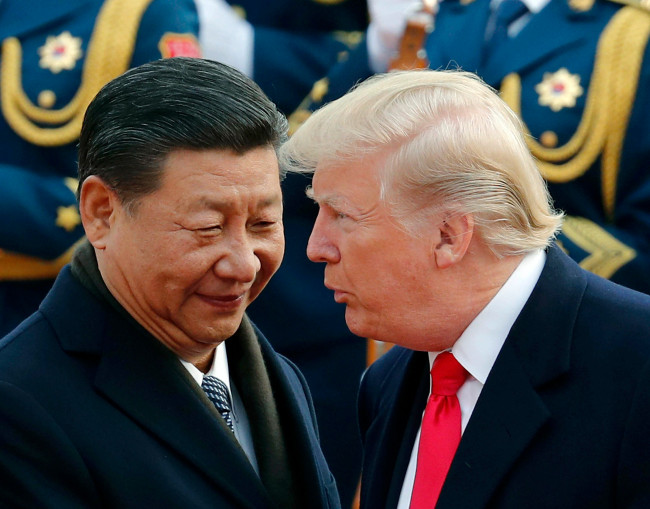US President Donald Trump and Chinese President Xi Jinping agreed Tuesday to keep sanctions on North Korea until the regime "permanently" dismantles its nuclear weapons program, the White House said.
Trump and Xi spoke by phone after the Chinese leader held two days of meetings with North Korean leader Kim Jong-un in the northeastern Chinese city of Dalian.
 |
Trump meets Xi Jinping during his visit to Beijing in November last year. (Yonhap) |
"The two leaders discussed issues of mutual interest, including recent developments on the Korean Peninsula and President Xi's meeting today with North Korean leader Kim Jong-un," the White House said in a readout.
Trump and Xi "agreed on the importance of continued implementation of sanctions on North Korea until it permanently dismantles its nuclear and missile programs," it said.
China has joined a U.S.-led campaign to sanction North Korea over its nuclear weapons and ballistic missile programs. Last year Beijing backed a series of UN Security Council resolutions designed to choke off funding for the weapons development.
The second Xi-Kim meeting in about 40 days came just weeks ahead of a planned summit between the US and North Korean leaders.
Kim reaffirmed his commitment to dismantling his nuclear weapons program if "relevant parties abolish their hostile policies and remove security threats against" his country, China's Xinhua news agency said, a remark apparently directed at the US.
The State Department noted China's role in resolving the nuclear issue.
"We have been working with China on the North Korea problem, as the President has made clear, and we expect that China will use its unique leverage to ensure the DPRK is serious about credible negotiations that lead down the path to the permanent and verifiable denuclearization of North Korea," Katina Adams, a spokesperson for the State Department, said in an email to Yonhap. DPRK is the acronym for North Korea's formal name, the Democratic People's Republic of Korea.
Kim also met with South Korean President Moon Jae-in in late April and agreed to pursue "complete denuclearization" of the Korean Peninsula and a peace treaty to formally end the 1950-53 Korean War. (Yonhap)






![[Herald Interview] 'Trump will use tariffs as first line of defense for American manufacturing'](http://res.heraldm.com/phpwas/restmb_idxmake.php?idx=644&simg=/content/image/2024/11/26/20241126050017_0.jpg)
![[Exclusive] Hyundai Mobis eyes closer ties with BYD](http://res.heraldm.com/phpwas/restmb_idxmake.php?idx=644&simg=/content/image/2024/11/25/20241125050044_0.jpg)
